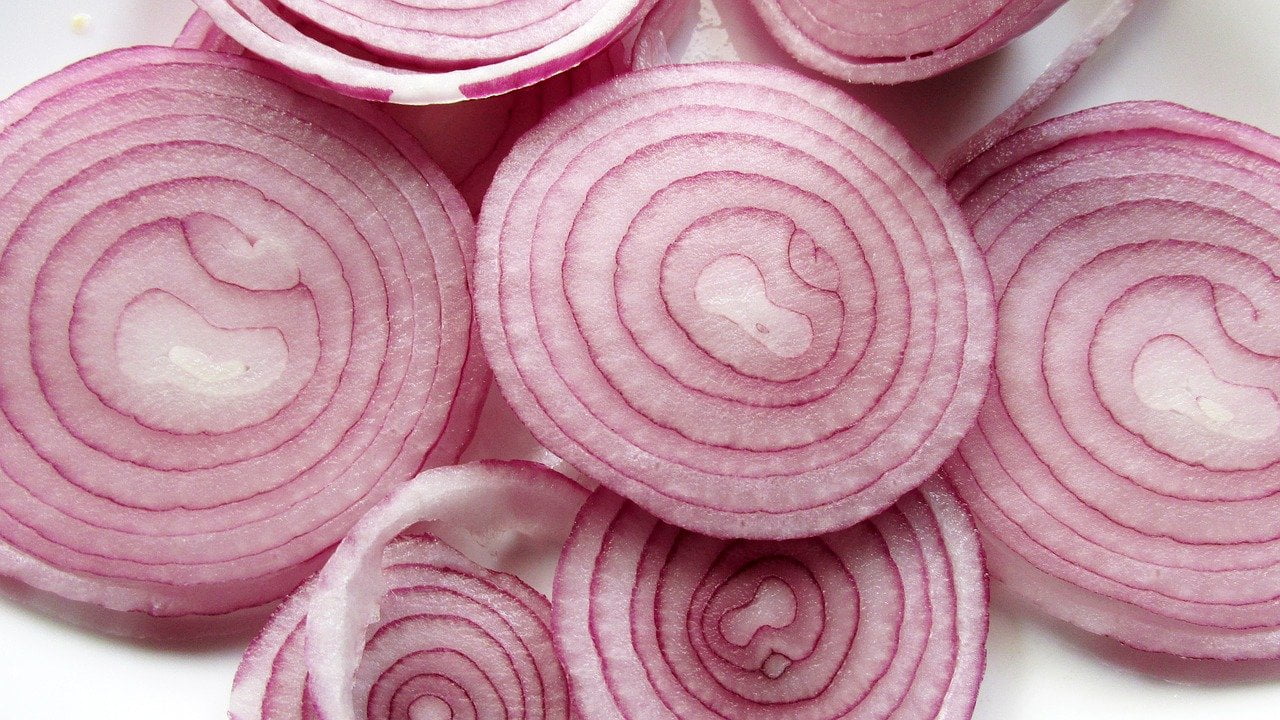Knowing how to keep onions fresh is a major advantage in cooking. Onions are essential ingredients when preparing food and are one of those veggies you’ll always find in any kitchen.
Just like garlic and chives, onions belong to the allium family. Thanks to a wide variety of onions, these offer the perfect basis for thousands of recipes across many different cuisines, which makes educating yourself about them much more important.
The first step is learning how to keep your onions fresh so you can get the most out of them. The onions you have lying around may be well past their prime so making sure they stay fresh and how long they will last depends on proper storage methods. And here, we’ll tell you all about it.
How To Keep Onions Fresh
Best Health Benefits Of Onions
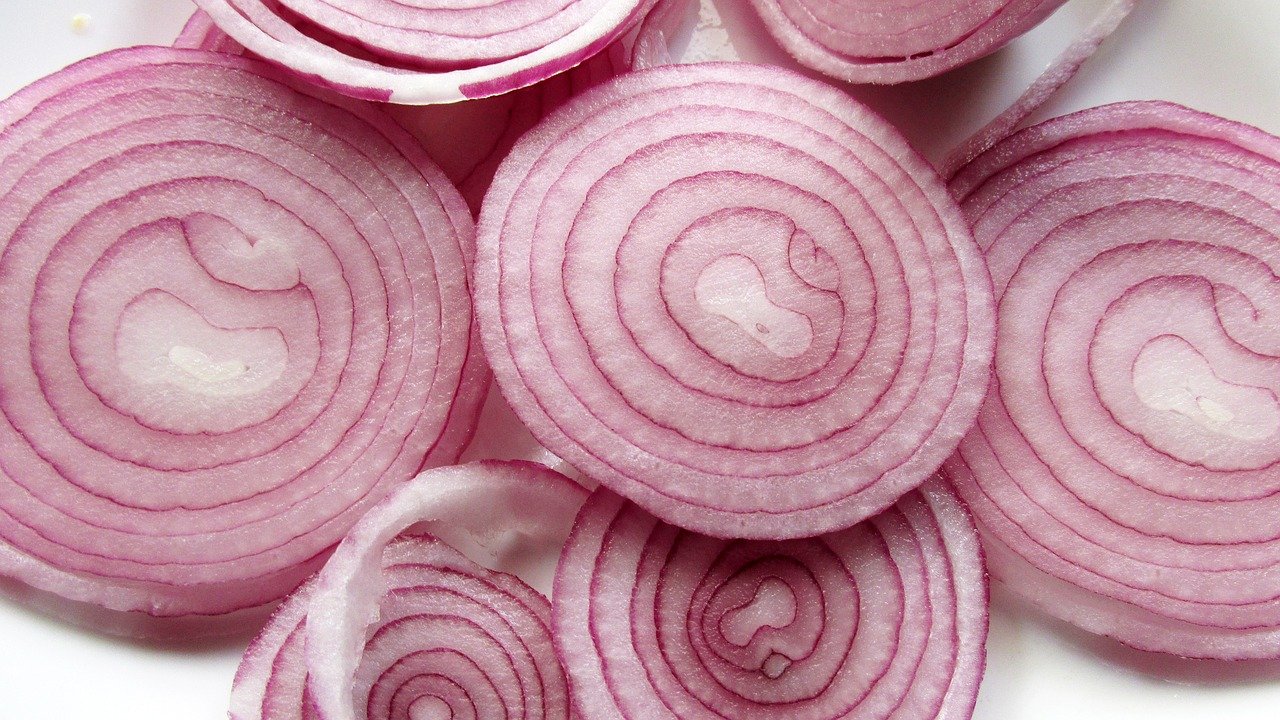
Though you hate them or you hate to love them, nobody can’t deny that onions are a necessity; and have been used for centuries not only to flavor foods but also to treat headaches, sores, and even heart-related disease, due to their unique medicinal properties.
Onions have vitamins, minerals, and intense compounds that are beneficial for our health. Check out some interesting health benefits you may not know about onions:
- Beneficial for the heart
Thanks to the antioxidants and compounds present in onions, these have the ability to fight inflammation, lower triglycerides, and helps bring down cholesterol levels -all of which may diminish the chance of heart disease. Onions have Quercetin, a flavonoid antioxidant that can help bring down high blood pressure and shield against blood clots.
- Protect against cancer
Researchers have conducted studies that show that vegetables from the Allium genus like onions and garlic are associated with a lower risk of specific cancers, like stomach and colorectal. Onions have onionin A, fisetin, and quercetin -these are compounds and antioxidants that have shown to lessen the growth of tumors.
- Keeps blood sugar under control
Many studies have shown that eating onions are beneficial for people with diabetes, helping them in keeping better sugar levels. Experts say this may be because onions possess quercetin and sulfur compounds, which have anti-diabetic effects.
- May improve bone density
Among many other foods, onions also support healthy strong bones. Onions suppose to help reduce bone loss, which in return could prevent osteoporosis and promote bone density.
- Promotes digestive health
Fiber and probiotics are needed for appropriate gut health and onions happen to be a rich source of these. Onions specifically contain inulin and fructooligosaccharides, helping raise friendly bacteria and boosting immune function.
Do onions last longer in the fridge or on the counter?

Onions are supposed to be kept in a cool, dark spot with a lot of ventilation, to avoid humidity get to them and rot.
Preferably, onions should be kept between 45 and 55 degrees F. Whole, raw onions will last two to three months when stored in a cool, dry place. Such spots could include a cellar, pantry, unheated basement, or even your garage.
That said, if you can’t find a place with such conditions then your best bet, though not ideal, in the fridge. Onions absorb moisture easily, so their texture becomes soft if kept in the fridge. Your onions will last for about two weeks in the fridge.
How do you store Onions at Room Temperature?
If you don’t have any other option then keeping your onions at room temperature, then make sure you pick a spot with proper ventilation to avoid molding.
Some effective ways to do this could include keeping the onions inside an open basket, mesh bag, or loosely covered paper bag. You can forget about plastic bags because it will hinder ventilation. Whole raw onions, will last for up to a week at room temperature.
How do you store Onions in the Refrigerator?
Whole onions may not be suitable to go in the fridge however, once you have peeled them, the fridge becomes your best bet to keep from contamination.
Onion pieces that have been sliced or chopped must be put away inside airtight containers and refrigerated. If stored this way, you’ll have onions for the next seven to ten days.
If you are left with cooked onions, then you should store them also in an airtight container and in the fridge. Your onions will be good for up to four days.
How to Keep Onions Fresh?

The golden rule to keep onions fresh is to keep them in a cool, dry, and dark place; away from moisture.
In order to keep your onions fresh is best to know exactly how to store them according to the exact type of onion you are dealing with and if you are handling a whole, chopped, or cooked onion.
Best Ways to Store Onions?
Check out the best ways to store onions in order to maximize their shelf life. Interested in reading about the many types of onions you can get your hands into? Check out Types of Onions guide
How to Store White Onions 
It’s best to put away whole white onions with the skin on in a cool, dry, dark place. Do not store whole white onions in a plastic bag because these need ventilation to stay fresh.
Already cut onions can be stored in an air-tight container in the refrigerator.
How to Store Yellow Onions

Though these have thicker skin than white onions, the same storing method can be applied. Store whole yellow onions in a cool, dry, dark place with the skin on avoiding plastic bags that can hamper ventilation.
How to Store Pearl Onions

There is something interesting besides its name about pear onions, they smell beautiful and their taste is one of a kind! Pearl onions usually come in a bunch in a container or bag, you want to keep these in a cool, dry, and dark location.
How to Store Sweet Onions
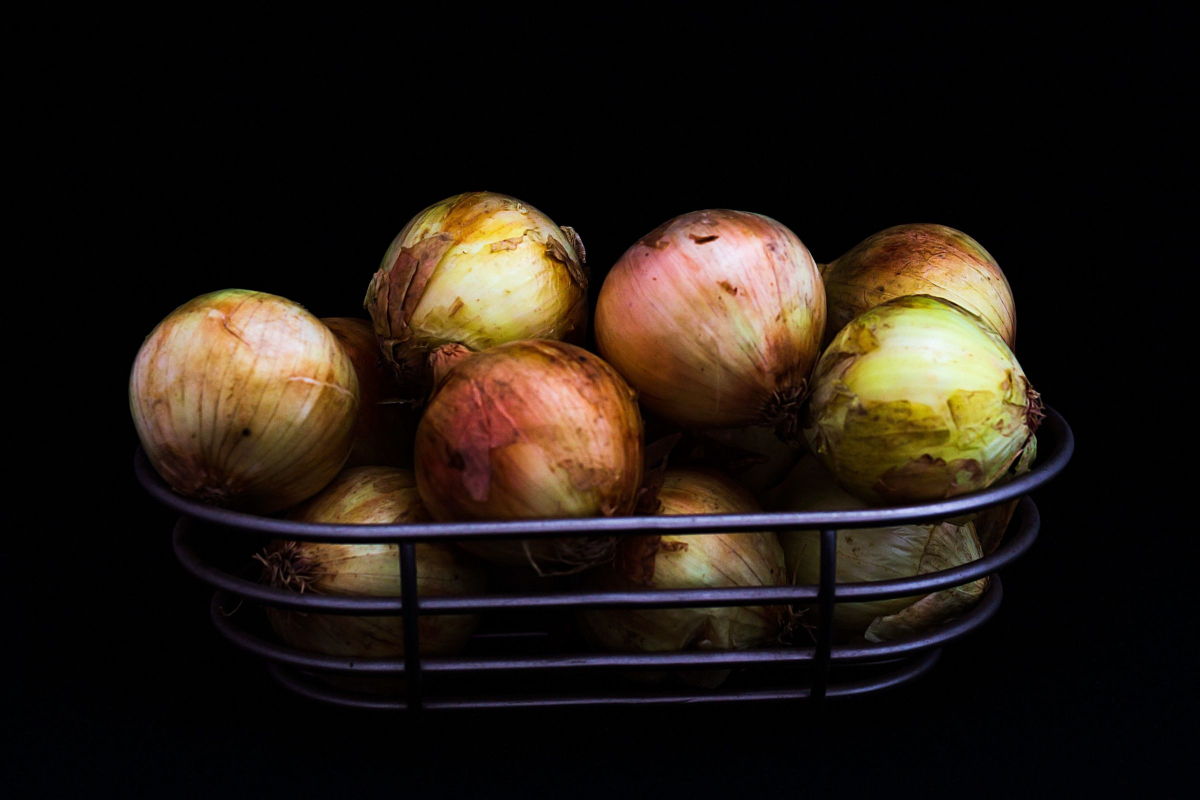
Once you’ve chosen firm, heavy and free of bruises sweet onions, you should wrap one by one in a paper towel and put away in the fridge’s drawer with the closed vent.
If you wish to use your sweet onions for later, then a good idea is to freeze them. After you’ve peeled and chopped your onion spread it on a baking sheet and put it in the freezer, once these are completely frozen, transfer the pieces to a Ziploc bag and back into the freezer.
How to Store Red Onions

The same rule applies for popular red onions which should be kept with their skin on, in a cool, dry, and dark place. Keep red onions in an air-tight container in the refrigerator, if already cut.
How to Store Green Onions

Green onions require airflow to stay crisp so steer clear of placing them in plastic bags. You should put them in the drawer of the fridge.
Another way to store green onions is to place them in a shallow glass of water root side down and make sure it gets some sun. The green tops will grow back several times.
How to Store Peeled Onions
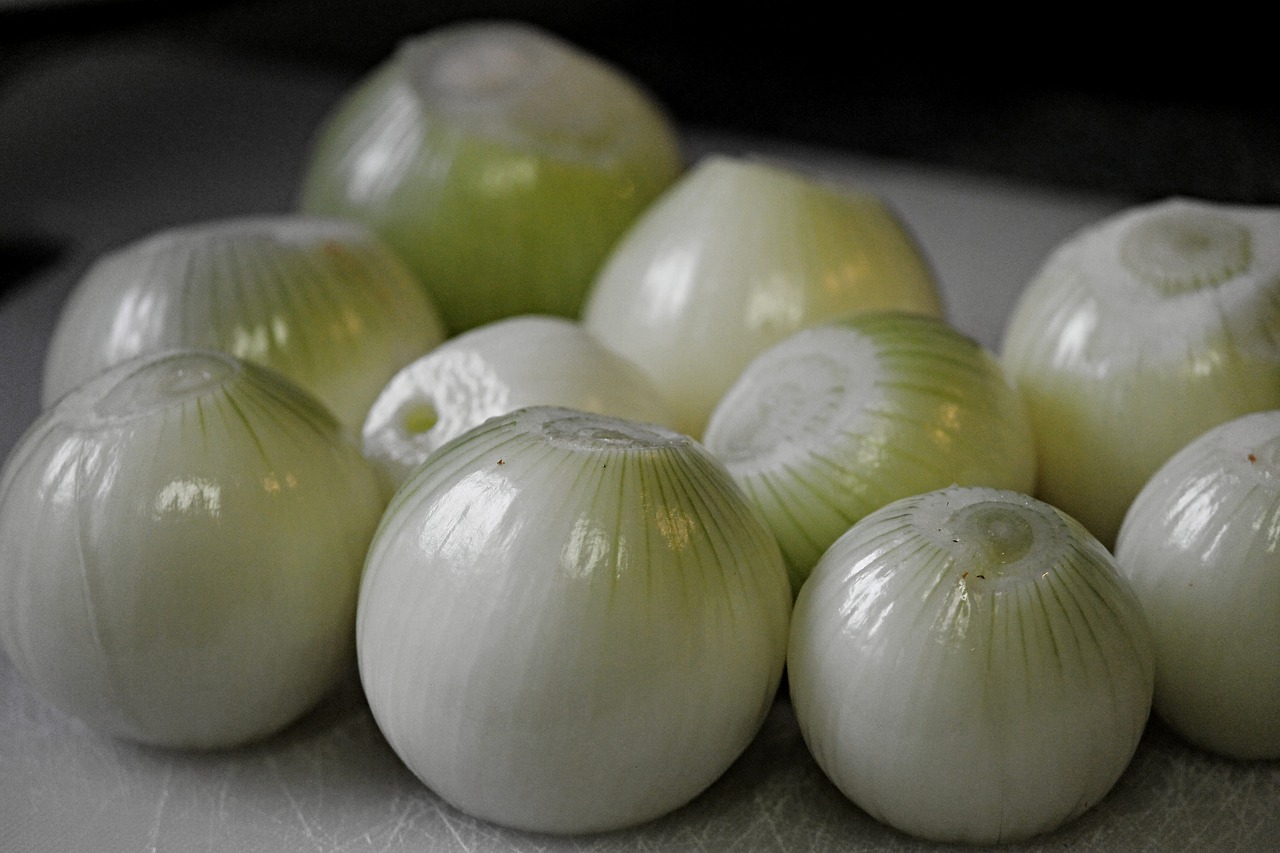
To keep peeled onions fresher and free of bacteria, put it in an airtight container inside the fridge. And /or if you run out of containers used plastic wrap, you can wrap them individually or as a whole.
If there are no containers left in your pantries and no plastic wrap in the house I usually use a paper towel and then place them inside any reusable plastic bag, the paper towel absorbs the moisture and the plastic bag keeps the smell inside.
How to Store Whole Onions
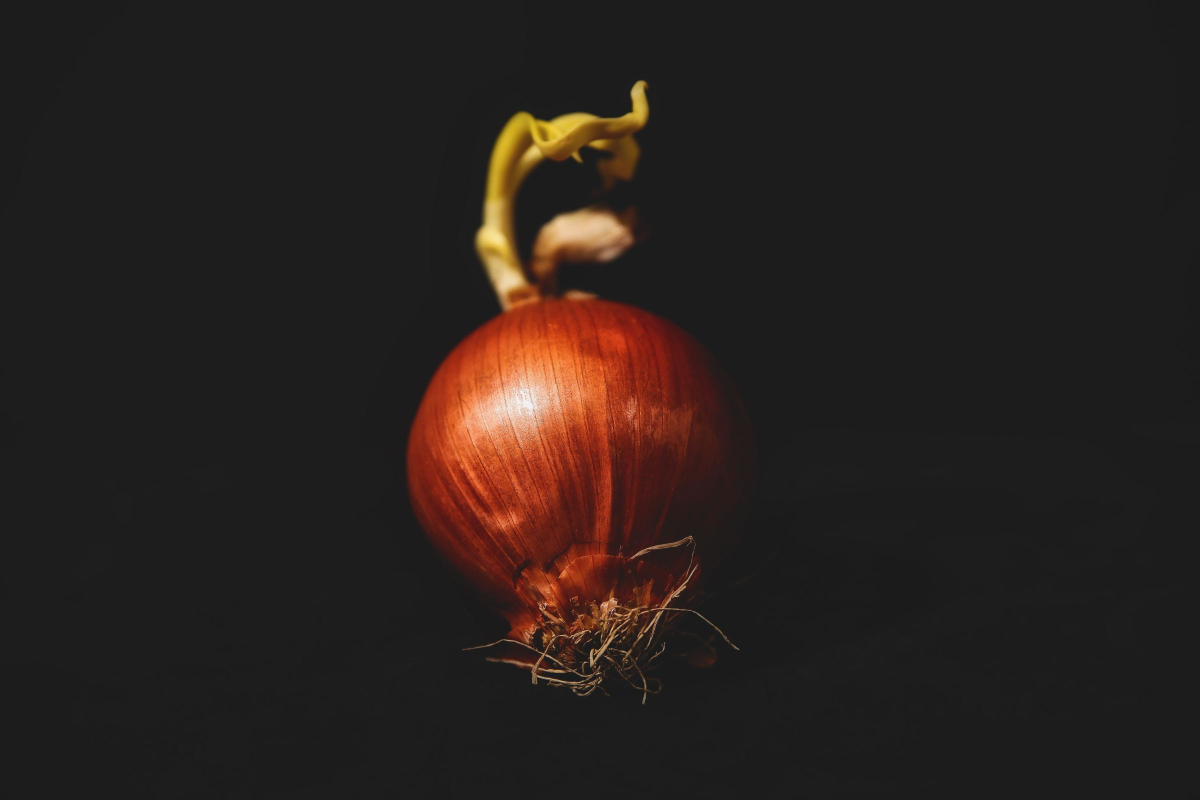
When dealing with whole onions, you want to avoid placing them in the fridge, the best bet to keep these fresh is to keep them in a mesh bag or inside a box with holes for proper ventilation.
How to Store Pickled Onions

Pickled onions should be stored at room temperature in a covered container in the refrigerator. These are best consumed within three days, but they should be good for about 2 to 3 weeks in the refrigerator.
If you are interested in making your own, check out this easy and awesome recipe.
How to Store Half Onions

Half onions should be wrapped in plastic and put away in the fridge. Cut up or chopped onions should go inside the fridge in a sealed container.
The plastic will keep it fresh but also will prevent the onion smell to spread all over; I think you are not going to like it if you take a bite of an apple with a weird onion-ish smell!
How to Store Cooked Onions
Cooked onions should be stored away in the fridge inside a container, within two hours after cooking to stop bacteria from growing. I find it helpful when I set an alarm on my phone, I can’t tell how many times I have walked to the kitchen at night and find that I forgot to put food containers in the fridge!!
How To Store Onions in The Freezer
If you wish your onions to last longer you could also freeze them! Just follow a few simple steps:
- Peel raw onions
- Slice or chopped as desired
- Transfer the pieces into a freezer bag or an airtight container or even aluminum foil or plastic wrap. This way you’ll have raw onions for up to eight months.
Cooked onions can also be frozen, just put them in a freezer bag or container inside the freezer. Your cooked onions will last for up to a year.
Three signs to know when Onions Have Gone Bad
Can’t tell if your onions are going bad; check out three signs that will squash all your doubts.
If your onion has changed to a brownish tone or is showing dark spots, this is a clear sign that mold is growing and will eventually go bad. Get rid of your onion if:
- When you find out your onions have begun sprouting
- If by touching, your onion feels soft or squashy
- If the smell is anything other than how onions should smell
How to Shop for Onions
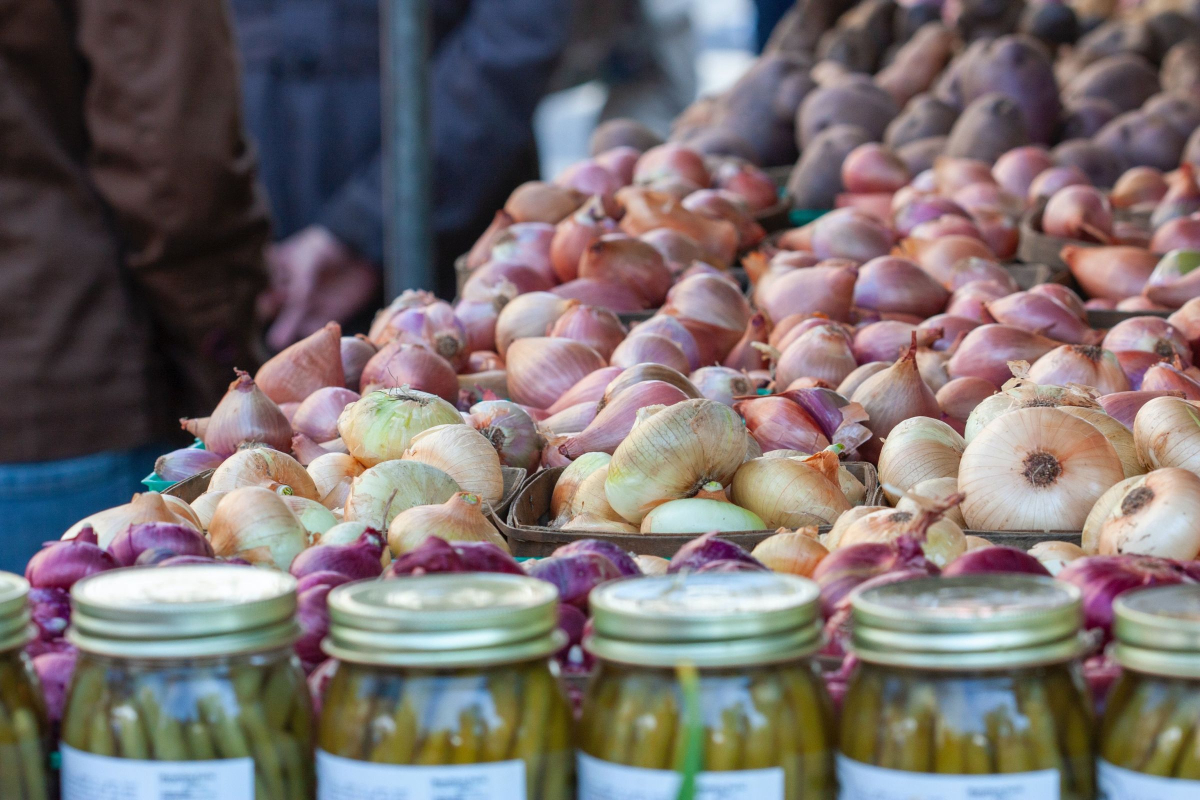
When buying onions you should always choose the ones that are unbruised, heavy for their size and firm.
Another thing to keep in mind is if you are shopping with a specific dish in mind. If this is the case, then focus on getting the type of onion described in your recipe. If not specified, then just get yellow onions -which are the most utilized in cooking.
onion can be classified in green onions or scallions (which go well raw for salads or as a garnish) and dry onions -which are covered with papery skin and come in different sizes, shapes, and flavors.
How to Choose the Right Type of Onion for Specific Dishes Recipes

Picking the right onion doesn’t have to be that difficult; however, you must be aware that all onions are not exactly the same and its flavor giving power could make or break your meal.
Check out which onions go well with what; feel like a real chef next time you step into the kitchen.
Cipollini Onions: These are best when cooked and can be enjoyed as a side dish or in a beef pot roast. These become creamy and sweet when cooked.
Shallots: Are best used in its raw state, their mellow sweet flavor makes them great for vinaigrettes. You can also roast them or fry them to sprinkle in your favorite salad or soup.
White Onions: Go great with salads, salsa, and tacos. This is the go-to option for Mexican food.
Pearl Onions: If you are thinking about making a sauce, pearl onions are your best choice; these not only go great with any sauce but also make a fantastic side dish on their own.
Sweet Onions: If you want just a little onion flavor in your food, sweet onions are the best option, their mild flavor makes them great in stir-fry.
Red Onions: Due to their strong flavor and color, these are often used raw in salads or salsa. When cooked, these become sweet, ideal for a salad topper.
Yellow Onions: Known as the universal use onions, these are great for dishes that need to be cooked for a long, because yellow onions won’t fall apart.

